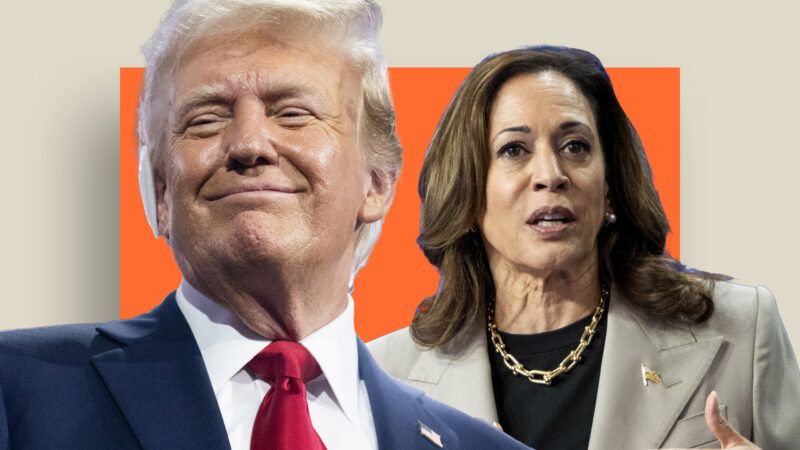Trump and Harris' Economic Plans Are Depressingly Similar
Both campaigns represent variations on a theme of big, fiscally irresponsible, hyper-interventionist government.

As we approach another pivotal election, voters are once again being bombarded with messaging that paints the two main candidates as opposites. We're told Vice President Kamala Harris and former President Donald Trump represent radically different visions for America's economic future. They don't. When it comes to economic policy, there's far less daylight between Harris and Trump than either would care to admit.
Let's start with trade policy. Trump's protectionist stance is well-known, with his administration imposing tariffs on a wide range of goods, particularly from China. He has since announced that he would like to impose an across-the-board 10 percent and then 20 percent tariff on imports to the U.S., on top of the those already in place.
But Harris' stance is hardly better. She has embraced a "worker-centered" trade policy that looks suspiciously similar to Trump's "America First" approach. Both emphasize protecting existing American jobs and industries, even at the cost of higher prices for beleaguered consumers, fewer resources to start new firms that will lead to more opportunity for the next generation of workers, and reduced economic efficiency. And let's not forget that during the last four years, the Biden-Harris administration has imposed its fair share of tariffs while keeping many of Trump's.
Both candidates have a penchant for industrial policy—the idea that government should actively shape the details of the economy by supporting specific industries or companies. Trump's efforts to prop up the steel industry and other handpicked companies are mirrored by Harris' push for green energy subsidies and tax credits. President Joe Biden's administration has extended many huge sums to the business world through large-scale legislation, including the Inflation Reduction Act's $1.2 trillion in subsidies through 2032.
Also, let's not forget that both parties favor giving away billions of dollars in subsidies to Intel through the CHIPS Act for the construction of semiconductors in the United States. Never mind that Intel is laying off thousands of workers because of its string of bad business decisions in the last 15 years. In too many arenas today, we see the government attempting to play economic kingmaker, a role it has historically performed poorly. Yet both Harris and Trump think that's a good idea.
Unsurprisingly, when it comes to government spending, both candidates are reckless. While the Republicans pay some lip service to cutting waste and abuse, neither Trump nor Harris appears willing to reform the utterly unsustainable financing behind Social Security and Medicare—not even to preserve these programs for lower-income Americans. Not only that, but we will have a catastrophic debt crisis if they're not reformed. Yet neither candidate cares.
Both sides want to subsidize homeownership. The Republican platform advocates for the government to "promote homeownership through Tax Incentives." The Harris campaign has announced a $25,000 subsidy for first-time homebuyers. Both plans would subsidize housing demand, thus putting upward pressure on housing prices. Great for people who already own homes; not so great for the new homebuyers themselves.
There are notable differences between the GOP and Democrats' positions on regulations, taxes, and immigration, but diminishing the ideological distinction is Republicans' new fondness for labor unions. The Harris campaign, meanwhile, echoes some other Trump-Vance policies, like the desire for enormous and unfunded child tax credits and the elimination of federal income taxes on tips. And I'll bet we can expect more equally irresponsible fiscal gestures in the weeks to come.
Why does this matter? For one thing, the result of so many tired and tried ideas is ballooning deficits, cronyism, and exploding national debt, regardless of who sits in the Oval Office. For another, voters deserve to understand the choice before them.
The media narrative of stark contrasts hides the fundamental similarities in each candidate's approaches to economic policy. Both Harris and Trump represent variations on a theme of big, fiscally irresponsible, hyper-interventionist government. Yes, Trump would deregulate some part of the economy (the best part of his economic plan), but in the end, neither the Republican nor Democratic candidate believes in comprehensive market-oriented reforms.
Libertarian candidate Chase Oliver does understand the power of free markets, the danger of unchecked government growth, and the importance of fiscal responsibility. But he is relegated to the background of this political fight. On the main stage, we're left with the illusion of choice between two sides of the same economically interventionist coin.
COPYRIGHT 2024 CREATORS.COM


Show Comments (37)